- Home
- Iain M. Banks
The Crow Road Page 6
The Crow Road Read online
Page 6
‘Prentice,’ he said, in tones of great import and sobriety. He put one hand on my shoulder and we turned away from the window where Verity stood, and away from the drinks, to walk up the length of the hall towards the stained-glass height of the gable-end window. ‘Your grandmother has gone to a better place, Prentice,’ Uncle Hamish told me. I looked back at the vision of wonderful-ness that was Verity, then glanced at my uncle.
‘Yes, Uncle Hamish.’
Dad called Uncle Hamish ‘The Tree’ because he was very tall, moved in a rather awkward way - as though made out of something less flexible than the standard issue of bone, sinew, muscle and flesh - and (so he claimed, at any rate) because he had seen him act in a school play once, and he had been very, well, wooden. ‘Anyway,’ my dad had insisted when he’d originally confided this private piece of nomenclature, only half a decade earlier, on the occasion of my sixteenth birthday, when we’d got drunk together for the first time, ‘he just lumbers about!’
‘She was a good woman, and did little that was bad and much that was good, so I’m sure she has gone to a reward rather than a punishment, living amongst our anti-creates.’
I nodded, and as we strolled amongst them, looked around at the various members of my family, the McGuskies (Grandma Margot’s maiden-family), the Urvill clan, and sundry worthies from Gallanach, Lochgilphead and Lochgair, and pondered, not for the first time, what on Earth (or anywhere else for that matter) had given Uncle Hamish the idea for his bizarre, home-made religion. I really didn’t want to go into all this right now, and anyway found the whole subject a little awkward, because I wasn’t actually quite as gung-ho for Hamish’s personal theology as he seemed to think I was.
‘She was always very kind to me,’ I told him.
‘And therefore your anti-create will be kind to her,’ Uncle Hamish said, still with one hand on my shoulder, as we stopped and looked up at the stained-glass monstrosity at the far end of the hall. This showed in graphic form the story of the Urvills from about the time of the Norman conquest, when the family of Urveille, from Octeville in Cotentin, had crossed into England, percolated northwards, swirled briefly around Dunfermline and Edinburgh, and finally come to rest - perhaps afflicted by some maritime memory of their ancestral lands on the seam of the Manche - in what had been the very epicentre of the ancient Scots kingdom of Dalriada, losing only a few relatives and a couple of letters on the way. Swearing allegiance to David I, here they have stayed, to mingle their blood with that of the Picts, the Scots, the Angles, the Britons and the Vikings who have all variously settled, colonised, raided and exploited this part of Argyll, or maybe just arrived at one time and forgotten to leave again.
The peregrinations and subsequent local achievements of the clan Urvill make interesting history, and would make fascinating viewing if the giant window telling the tale wasn’t so badly done. The fashionable but untalented son of one of the previous head Urvill’s school pals had been commissioned to execute the work, and had taken the brief all too literally. Deadly dull and eye-squintingly garish at the same time, the stained glass window made me want to grit my teeth.
‘Yes, I’m sure you’re right, uncle,’ I lied.
‘Of course I am, Prentice,’ he nodded slowly. Uncle Hamish is balding, but of the school that believes long wisps of hair grown on one side of the head and then combed delicately across the pate to the other edge look better than naked skin exposed to the elements. I watched the coloured light from the stained glass window slide over shiny skin and hardly less luminescent oiled hair, and thought what a prat he looked. I inadvertently found myself humming the appropriate piece of music from the Hamlet cigar adds and thinking of Gregor Fisher.
‘Will you join me in worship this evening, Prentice?’
Oh shit, I thought. ‘Perhaps not, actually, uncle,’ I said, in tones I hoped sounded regretful. ‘Have to pop down the Jac to talk to a girl about a jacuzzi. Probably go straight from here.’ Another lie.
Uncle Hamish looked at me, the grain-like lines on his forehead bunching and tangling, his brown eyes like knots. ‘A jacuzzi, Prentice?’ He pronounced the word the way the lead in a Jacobean tragedy might pronounce the name of the character who has been his nemesis.
‘Yes. A jacuzzi.’
‘That’s a form of bath, isn’t it?’
‘It is.’
‘Not meeting this young lady in a bath, are you, Prentice?’ Uncle Hamish’s lips twisted slowly into what was probably meant to be a smile.
‘I don’t believe the facilities of the Jacobite Bar run to such a thing, uncle,’ I told him. ‘They’ve only recently got round to installing hot water in the gents. The relevant jacuzzi is in Berlin.’
‘The German city?’
I thought about this. Could I have mis-heard Ash and she have been talking about the briefly famous chart-topping band of the same name? I thought not. ‘Yes, uncle; the city. Where the wall was.’
‘I see,’ Uncle Hamish nodded. ‘Berlin.’ He stared up at the violently clashing leaden imagery of the great stained-glass window. ‘Isn’t that where Ilsa is?’
I frowned. ‘Aunt Ilsa? No, she’s in Patagonia, isn’t she? Incommunicado.’
Uncle Hamish looked suitably confused as he contemplated the garish gable glass. Then he nodded. ‘Ah yes. Of course.’ He looked back down at me. ‘However. Shall we see you for supper, Prentice?’
‘I don’t know,’ I admitted. ‘Just as likely to end up with a kebab, I imagine. Or a fish supper.’
‘Well, you have your key with you?’
‘Oh yes. Thanks. And I’ll be ... you know; quiet, when I come in.’
‘Right.’ Uncle Hamish gazed back up at the crass glass. ‘Right. We’ll probably be off in a half-hour or so; let us know if you do want a lift.’
‘Surely.’
‘Right you are, then.’ Uncle Hamish nodded, turned, then looked back with an intensely puzzled expression. ‘Did I hear somebody say mother exploded?’
I nodded. ‘Pacemaker. That’s what Doctor Fyfe was rushing to tell us; told dad in the ambulance. But it was too late by then, of course.’
Uncle Hamish looked more baffled than ever, but nodded eventually and said, ‘Of course,’ and walked off over the parquet with a startlingly tree-like creaking noise which I realised - with a small but welcome surprise - was issuing from his black brogues.
I made straight for the sideboard with the drinks, but a quick inspection of the casement of the relevant window on my way there revealed that Verity the Comely had gone.
Fortingall is a modest hamlet in the hills north of Loch Tay, and it was there in the winter of 1969 that my Aunt Charlotte was determined to consummate her marriage. Specifically, she wanted to be impregnated beneath the ancient yew tree that lies in an enclosure within the graveyard of the small church there; she was convinced that the tree - two thousand years old, according to reliable estimates - must be suffused with a magical Life Force.
It was a dark and stormy night (no; really), the grass under the ancient, straggling, gnarled yew was sodden, and so she and her husband, Steve, had to settle for a knee-trembler while Charlotte held onto one of the overhanging boughs, but it was there and then - despite the effects of gravity - that the gracile and quiveringly prepossessing Verity was conceived, one loud night under an ink black sky obscuring a white full moon, at an hour when all decent folk were in their beds and even the indecent ones were in somebody’s, in a quaint little Perthshire village, back in the fag end of the dear old daft old hippy days.
So my aunt says, and frankly I believe her; anybody wacko enough ever to have bought the idea that there was some sort of weird cosmic energy beaming out of a geriatric shrub in a back-end-of-nowhere Scottish graveyard on a wet Monday night probably hasn’t the wit to lie about it.
‘Naw, she’s great, I mean really really great. I’m in love. I love her; I’m hers. Verity; take me; put me out of my misery. O God ...’
I was drunk. It was getting on towards midnight
in the Jacobite bar and at my normal rate of drinking that meant I’d had about ten pints of export. Ash and Dean Watt, and another couple of old pals, Andy Langton and Lizzie Polland, had all drunk about the same as I had, but then they’d been home for their tea and they hadn’t been swilling back the Urvill’s whisky for a significant part of the afternoon.
‘So have you told her, Prentice?’ Ash said, putting down another set of pints on the pocked copper table we were hunched around.
‘Ah, Ash,’ I said, slapping the table. ‘I admire a woman who can carry three pints at the same time.’
‘I said, have you told this lassie you love her, Prentice?’ Ash said, sitting down. She took a bottle of strong cider from one breast pocket of her navy shirt, and a glass of whisky from the other.
‘Wow!’ I said. ‘Ash! I mean, like; wow! Wicked.’ I shook my head, took up my old pint and finished it.
‘Answer the lassie,’ Dean said, nudging me.
‘No, I haven’t,’ I confessed.
‘Ya coward,’ said Lizzie.
‘I’ll tell her for you if you like,’ Droid offered (there is an entire generation of Andrews with the shared nickname of Droid, post Star Wars).
‘Na,’ I said. ‘But she is just fabulous. I mean -’
‘Why not tell her?’ Liz asked.
‘I’m shy,’ I sighed, hand on heart, eyes heaven-ward, lashes fluttering.
‘Get out a here.’
‘So tell her,’ Ash said.
‘Also,’ I sighed. ‘She’s got a boyfriend.’
‘Ah-ha,’ Ash said, looking at her pint.
I waved one hand dismissively. ‘But he’s a wanker.’
‘That’s all right, then,’ Liz said.
I frowned. ‘Actually, that’s the only flaw Verity seems to have; her lousy taste in men.’
‘So you are in with a chance then?’ Liz said brightly.
‘Yeah,’ I said. ‘I think she’s going to chuck him.’
‘Prentice,’ Ash insisted, tapping the table. ‘ Tell her.’
‘I can’t.’
‘Why not?’
‘Because I wouldn’t know how to,’ I protested. ‘I’ve never told anybody I love them before. I mean, how do you? The words sound so corny, so devalued. It’s so ... it’s just such a cliche.’
Ash looked scornful. ‘What rubbish.’
‘Well, smarty-pants,’ I said, leaning over to her. ‘Have you ever told anybody you love them?’
‘Hundreds of times, darling.’ Ash said in a deep voice, pouting. Dean guffawed. Ash drank from her pint, then shook her head. ‘Well, actually, no.’
‘Ha!’ I said.
Ash leaned over to me, her long nose almost touching mine. ‘Tell the girl, you idiot.’
‘I can’t,’ I said, sitting back. ‘I just can’t. She’s too perfect.’
‘ What?’ Ash frowned.
‘Infallible. Too perfect; ideal.’
‘Sounds like misogynist romantic shite to me,’ snorted Liz, who’s always taken a hard line on such things.
‘It is,’ I admitted. ‘But she’s just incredible. D’you know where she was conceived?’
Dean and Ash exchanged looks; Andy spluttered into his beer while Lizzie rolled her eyes. ‘Aw yeah,’ Dean said, nodding and looking quite serious. ‘Doesn’t everybody?’
I was shocked, and almost cut short my next gulp of beer. ‘You don’t really, do you?’
‘Course not, Prentice,’ Ash said shaking her head. Her long fair hair spilled from over one shoulder. ‘What diff -’
‘Aw, it’s just incredible,’ I told them. ‘Her mum told me; Aunt Charlotte. Bit of a nutter, but okay. I mean totally aff her heid really, but anyway -’ I took another gulp of beer, ‘- she had this thing about psychic energy or some crap like that ... and about Scottish history -’
‘Aw; runs in the family, does it, Prentice?’ Dean asked.
‘Naw; she’s not a McHoan ... anyway; she’d married this English guy called Walker and they hadn’t consummated the marriage, right, not on their wedding night; she wanted to wait, and when they did get it together she made sure it was in this wee village called Fortingall, right? Near Loch Tay. Thing is, she’d heard something about Fortingall being where Pontius Pilate -’
‘Wait a minute,’ Dean said. ‘How long was it between them getting married and them humping?’
‘Eh?’ I scratched my head. ‘I don’t know; a day or two. Oh! I mean, they’d done it before, like. It wasn’t their first time or anything. It was just Aunt Charlotte’s idea that it’d be more special if they hadn’t done it for a while, and then did it under this tree. But they had been fucking before. I mean; good grief, this is the love generation we’re talking about here.’
‘Right,’ Dean said, apparently mollified.
‘Anyway; Fortingall is where some people say Pontius Pilate was born, and -’
‘Whit?’ Andy said, wiping his beard. ‘Away ye go.’
‘So they say,’ I insisted. ‘His dad was in the ... shit ... the seventh legion? The ninth? Damn ...’ I scratched my head again, looked down at my trainers (and thought with some relief that at least tonight I would not have the long struggle to undo the buckles and untie and then loosen the laces on the Docs, which were my usual drinking gear these days). ‘Or was it the seventh legion?’ I pondered, still staring at my Nikes.
‘Never mind if it was the fuckin’ foreign legion,’ Droid said, exasperated. ‘You’re no trying to tell us Pontius fucking Pilate was born in Scotland!’
‘Well maybe!’ I said, spreading my arms wide and almost spilling Ash’s whisky. ‘His dad was in the legion stationed there! Apparently! I mean, the Romans had a military camp and Pontius Pilate’s pa was stationed there, maybe, and so young Pontius could have been born there! Why not?’
‘You’re making this up,’ laughed Ash. ‘You’re just like your dad; I remember those stories on a Sunday afternoon.’
‘I am not like ma dad!’ I yelled.
‘Hey, shoosh,’ Lizzie said.
‘Well, I’m not! I’m telling the truth!’
‘Aye, well,’ Ash said. ‘Maybe. People get born in funny places. David Byrne was born in Dumbarton.’
‘Anyway; Pontius Pi -’
‘Whit?’ Dean grimaced. ‘The guy that wrote Tutti Frutti?’
‘Listen; Pontius -’
‘Na; that was John Byrne,’ Lizzie said. ‘David Byrne; the guy in Talking Heads, ya heidbanger.’
‘Look, anyway, forget Ponti -’
‘Anyway, it was Little Richard.’
‘Will you shut up? This isn’t about Pon -’
‘What? In Talking Heads?’
‘Shut up! I’m telling you; Po -’
‘Na; that wrote Tutti Frutti.’
‘I give in,’ I said, sitting back. I sighed, supped my export.
‘Aye, the song; but no the film.’
‘It wasnae a fillum; it was a series.’
‘Ah know; you knew what ah meant.’
‘I hate these drunken, rambling conversations,’ I breathed.
‘Aye, but I’ve heard worse.’ Ash nodded.
‘Anyway, it wasnae fillum at all; it was video.’
‘It was naawwwt!’ Dean drawled scornfully. ‘Ye could see it was fillum! What sort a telly have you got?’
I crossed my legs, crossed my arms and swivelled to look at Ash. I rubbed my rather greasy face and focused on her. ‘Hi. Come here often?’
Ashley pursed her lips and studied the ceiling. ‘Just the once,’ she said, frowning at me. ‘In the toilets.’ She gathered my shirt lapels in her fist and pulled me close to her face. ‘So who talked?’
‘Fnarr fnarr,’ I breathed over her. Ash’s face wrinkled, quite attractively, actually. But then it was late.
‘Hi youse,’ a deep voice said, bending over us. ‘Yer oan.’
‘On what?’ I asked the very large fellow with very long hair who had spoken.
‘The pool table; PM and AW; that’s y
ouse, is it no?’
‘Shit, aye, right enough.’
Ash and I went to play pool.
I’d been just about to ask her about the jacuzzi in Berlin, but now didn’t seem like the right time.
Uncle Fergus had the observatory built back in 1974 (when the heavenly Verity was four). The idea was two-fold. First of all - according to my father - Fergus wanted a bigger and better telescope than he had. Dad had a three-inch refractor in a shed in the garden at Lochgair. Fergus ordered a six-inch reflector. Also, it was a business sample. The lenses and mirror were to be made in the new Specialist Glass Division of the Gallanach Glass Works, the Urvill-owned factory which even yet provides the town with a significant proportion of its employment. Not only, therefore, would Uncle Fergus have a fascinating and unique additional feature for his not-long restored castle, it would be both an advertisement for his Glass Works and tax-deductible!
The fact the telescope was a wee bit close to Gallanach itself, and so possibly prone to light pollution from the town’s sodium vapour lamps, was less of a problem than it might appear; with Uncle Fergus’s connections he could have the offending lamps shaded at the council’s expense. So Uncle Fergus was prepared if necessary - and only selectively, of course - to dim his home town.
(His niece had already bettered that; when the diminutive, bloody and bawling form of Verity Walker had appeared on the scene, the lights had actually gone out.)
I’d met the sublime Verity for the first time in some years in the observatory, one coal-sack-black moonless night in 1986, a few days before I left to go to University, when I was already full of the exhilaration and fear of departure and independence, and the whole huge world seemed to be opening up before me, like some infinite blossom of opportunity and glamour. The twins had taken to having star-gazing parties in the cold, cramped hemisphere which protruded from the summit of the compact castle, and I’d arrived late after being out on the hill with little brother James during the afternoon and then suffering a delayed tea because some friends of dad’s had showed up unannounced and had to be catered for.

 Use of Weapons
Use of Weapons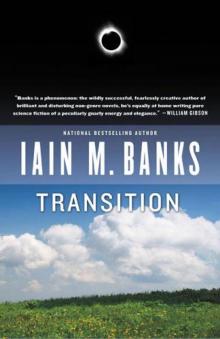 Transition
Transition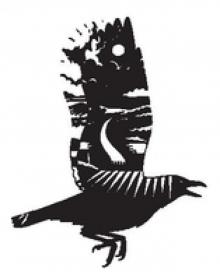 The Crow Road
The Crow Road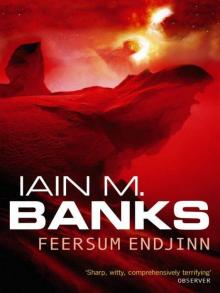 Feersum Endjinn
Feersum Endjinn Matter
Matter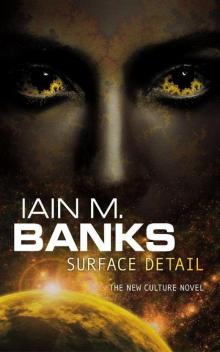 Surface Detail
Surface Detail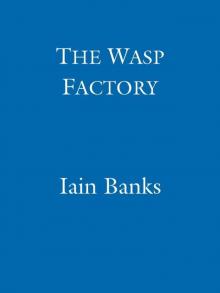 The Wasp Factory
The Wasp Factory Consider Phlebas
Consider Phlebas Against a Dark Background
Against a Dark Background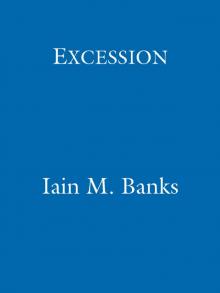 Excession
Excession The Hydrogen Sonata
The Hydrogen Sonata The Algebraist
The Algebraist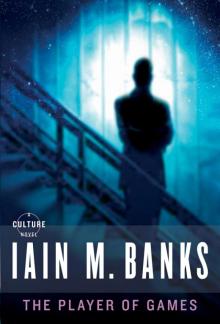 The Player of Games
The Player of Games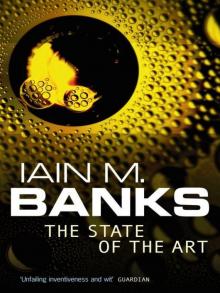 The State of the Art
The State of the Art The Hydrogen Sonata c-10
The Hydrogen Sonata c-10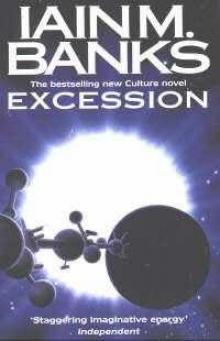 Excession c-5
Excession c-5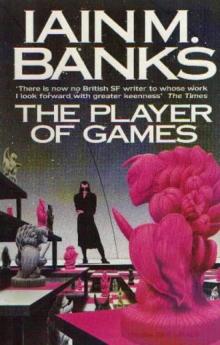 The Player of Games c-2
The Player of Games c-2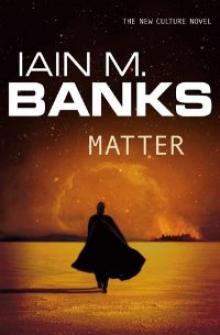 Matter c-8
Matter c-8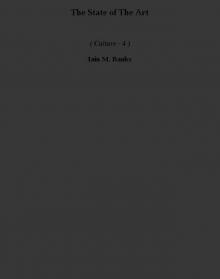 The State of The Art c-4
The State of The Art c-4 Look to Windward c-7
Look to Windward c-7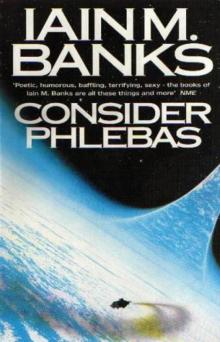 Consider Phlebas c-1
Consider Phlebas c-1